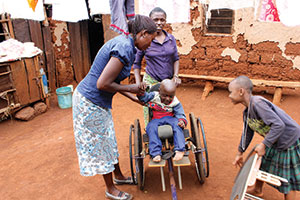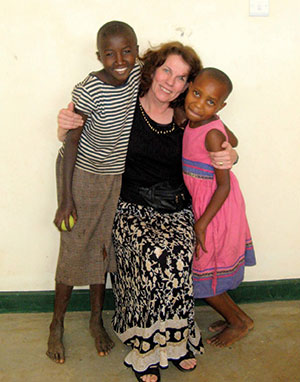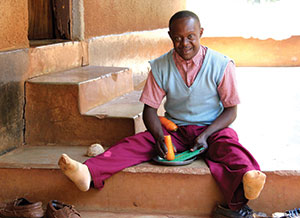When Betsy Buschkemper arrived at the Building a Caring Community (BCC) center in Moshi, Tanzania, 5-year-old Brian took her hand and tugged her inside to see his toys.
This lively, happy little boy had once been so weak, Buschkemper learned, that he couldn’t hold his head up. Born prematurely, doctors told his mother that he would never walk, talk or function normally.

Calvin, a child with disabilities, receives an in-home medical screening from Building a Caring Community (BCC) administrators in a remote part of the Rau KDC area in Tanzania.
Ashamed of his diagnosis, his family kept him at home until BCC staff visited and invited them to bring Brian (last names of BCC clients withheld) to the center.
Enrolled in its therapeutic day program, Brian flourished. At 3 he began to walk. Now he attends a primary school that serves special needs children. Brian is one of 206 children with intellectual and physical disabilities served by the BCC program, a partnership between the Northern Diocese of the Evangelical Lutheran Church in Tanzania and Mosaic International, based in Omaha, Neb. Mosaic, a faith-based organization, serves more than 3,700 people with intellectual disabilities.
The partnership has its roots in the companion relationship between the Nebraska Synod and the Northern Diocese. Through visits and exchanges, hundreds of Nebraskans and Tanzanians have gotten to know one another, including leaders of Nebraska’s social ministry agencies.
Mosaic leaders “drank deeply of the whole experience,” said David DeFreese, the organization’s vice president of church relations. The former Nebraska Synod bishop arranged for Frederick Shoo, former diocese bishop, to visit Mosaic’s facilities in Axtell, Neb., where Lutherans have cared for people with disabilities for more than 100 years.
Aware that stigma against people with disabilities in Tanzania often results in unregistered births and lives spent in the shadows, Shoo “invited Mosaic into the relationship” to grow the ministry, DeFreese said.
Today, 10 BCC day centers carry out their work in parish buildings or on donated land. Contributions from the parishes, diocese and Mosaic, as well as grants from ELCA World Hunger, cover the operating budget.
Led by Tanzanians, the multicultural centers serve Lutherans, Roman Catholics, Muslims and practitioners of traditional African religion.
Shaeli Urassa, director of Moshi Center 2, was working in her Lutheran congregation’s kindergarten when her pastor suggested she volunteer with BCC. She began knocking on doors to find hidden children and opening doors to new arrivals like the mother carrying her 2-pound, 10-month-old with hydrocephalus (excess fluid in the brain).
“I love children, and when I work with these children I feel so happy,” she said. “I see how important it is to live our faith this way.”

Betsy Buschkemper, a pediatric nurse, finds her volunteer work supporting children in the BCC program to be rewarding and inspiring.
The center’s goal is to help families move beyond isolation and stigma into full participation in their community. Besides caring for kids in the centers and in the homes of especially fragile children, BCC staff train parents to care for special needs, set up projects that increase family incomes, and provide job opportunities for disabled young people beyond school age.
“Families are hungry for that information and that feeling of support and acceptance,” said Kelly Lytle, international relations director for Mosaic.
Addressing medical needs
Since kids like Brian also have complicated medical situations, the BCC program offers regular physicals and visits to doctors and hospitals when necessary.
But doctors “sometimes don’t know what to do with them,” said Buschkemper, a pediatric nurse practitioner who volunteers her clinical skills to help the BCC improve medical outcomes.
“When you see a 4- or 8-year-old who can’t walk or talk, you wonder why,” she said. “Is it cerebral palsy, a traumatic brain injury, a genetic syndrome, complications of labor or premature birth, or autism? A more informed medical diagnosis makes it easier to know how to help.”
When the children first began to turn up in clinics and hospitals, “we had a tremendous amount of struggle,” Buschkemper said. “Some doctors refused to treat our children because of their disabilities.”
Relations have improved, but in the future Buschkemper hopes to offer in-service training to BCC staff and local physicians to increase their capacity to diagnose and treat disabilities.
“There are ways to help kids with swallowing difficulties eat without aspirating, or assist with toileting and bladder control problems,” she said. “We can also look at medications and adaptive equipment like bathroom rails.”
A frequent visitor to Tanzania, Buschkemper previously volunteered in the diocese’s hospitals, most recently in its nursing and clinical officer training program.
The member of Augustana Lutheran Church, Omaha, has also volunteered in Malawi, Central and South America, and Asia.
Working with the BCC, she has moved from “feeling pity” for children like Brian to celebrating “the potential and the happiness and joy they feel and know in life that they wouldn’t have had a chance for otherwise,” she said. “Brian has a shot at a normal life now and is a happy little boy.”

Jonathan helps prepare the noon meal at the Rau KDC center for children with disabilities.
Mosaic is a member of Lutheran Services in America (LSA) and the LSA Disability Network. The network is a nationwide association of Lutheran social ministry agencies, faith-based organizations and Lutheran professionals that support people with intellectual and developmental disabilities and related conditions. Its member organizations provide support to more than 150,000 individuals in 32 states and the U.S. Virgin Islands.
The ELCA receives the outreach and hospitality gifts of the Evangelical Lutheran Church in Tanzania. It supports key congregational and educational ministries, as well the Tanzanian church’s 21 hospitals, providing 15 percent of health services in this multiethnic, multireligious country. Twenty ELCA synods are engaged in relationships with dioceses.




